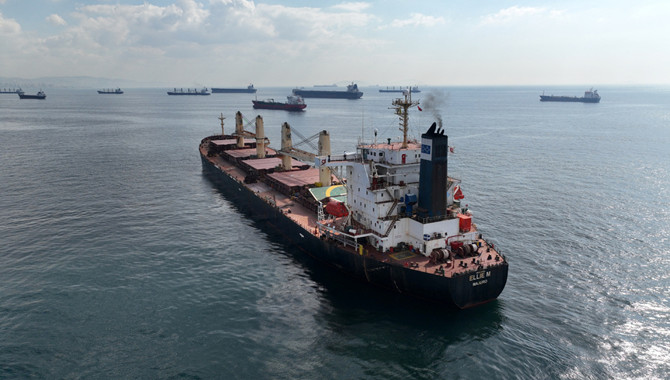Pacific Island nations are using a meeting this week to press the United Nations body responsible for regulating global shipping to enhance its efforts to decarbonize the world's merchant fleet.
The International Maritime Organization, or IMO, began a meeting of its Marine Environment Protection Committee on Monday, with the discussions to wrap up on Friday.
The decarbonization of merchant fleets was a topic that received only scant media attention at the recently concluded COP27 climate summit in Egypt, but it is one which Pacific Island states have been pushing for years.
The Marshall Islands, which has been at the forefront in the campaign to decarbonize shipping, says the industry must cut its greenhouse gas emissions to align with the Paris Agreement temperature target of keeping global warming within 1.5 C above preindustrial levels.
"When you look seriously at the science, when you begin to ask what the future of efficient and effective shipping looks like in a two-degree, in a three-degree world, when you look at the mounting evidence of the climate emergency, I have to ask if we have gone hard enough?" Marshall Islands' Ambassador to South Korea Albon Ishoda told Radio New Zealand last month.
Ishoda, who is also the Marshall Islands' ambassador to the IMO, said the Pacific region wants all sectors to do all that is possible to cut their emissions.
International shipping plays a central role in global trade, carrying 70 percent of the world's trade and more than 80 percent by volume. It is also a significant source of greenhouse gas, or GHG, emissions, accounting for around 2.89 percent of global emissions according to a study by the IMO.
Initial strategy
In April 2018, the IMO, the UN agency which governs world merchant shipping, adopted what it called an Initial Strategy on the Reduction of GHG Emissions from Ships, setting out the agency's commitment to reducing emissions from international shipping, and to eventually phasing them out by 2050.
A spokesperson for the IMO said the strategy will be revised and upgraded in 2023.
"Since the adoption of the strategy, IMO has made good progress with the consideration and implementation of some of the short-term GHG reduction measures," the spokesperson told China Daily.
The spokesperson noted that fossil fuel still represents the majority of fuel used by ships, but the use of liquefied natural gas has increased significantly for bulk carriers, container ships and cruise passenger ships.
IMO member states, which include the Pacific islands, are moving forward on research and development of low- and zero-carbon fuels and the "uptake of these new fuels", the spokesperson said.
Guy Platten, secretary-general of the International Chamber of Shipping, or ICS, which represents 80 percent of the world's merchant shipping, told China Daily that decarbonization has been slow.
"Even so our members are committed to reaching the industry's ambitious net-zero by 2050 target."
He said the ICS recently submitted a "fund and reward" proposal to the IMO to accelerate the maritime sector's transition to net-zero by financially rewarding ships and energy producers that invest in low-and net-zero emission fuels.
"To achieve net-zero by the mid-century, new alternative fuels must start to become available in significant quantities on a commercial basis no later than around 2030," Platten said.
"International shipping accounts for 3 percent of global greenhouse gas emissions, so its decarbonization efforts are vital to the wider success of a movement toward net-zero carbon emissions by 2050."
The opinions expressed herein are the author's and not necessarily those of The Xinde Marine News.
Please Contact Us at:
media@xindemarine.com


 Ningbo Containerized Freight Index Weekly Commentar
Ningbo Containerized Freight Index Weekly Commentar  Ningbo Containerized Freight Index Weekly Commentar
Ningbo Containerized Freight Index Weekly Commentar  Ningbo Containerized Freight Index Weekly Commentar
Ningbo Containerized Freight Index Weekly Commentar  BIMCO Shipping Number of the Week: Bulker newbuildi
BIMCO Shipping Number of the Week: Bulker newbuildi  Ningbo Containerized Freight Index Weekly Commentar
Ningbo Containerized Freight Index Weekly Commentar  Ningbo Containerized Freight Index Weekly Commentar
Ningbo Containerized Freight Index Weekly Commentar